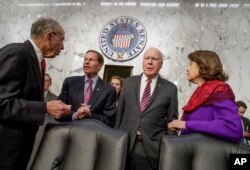U.S. Supreme Court nominee Neil Gorsuch was grilled Wednesday during testimony before a Senate panel about his role in approving severe interrogation methods when he was an attorney in President George W. Bush's administration.
The top Democrat on the Senate Judiciary Committee, Dianne Feinstein, questioned Gorsuch about why he had written "yes" on a document next to a question about whether a CIA torture program had produced useful intelligence.
"My recollection of 12 years ago is that that was the position that the clients were telling us," Gorsuch said. "I was a lawyer. My job was as an advocate, and we were dealing with detainee litigation. That was my job."
Another Democrat, Senator Patrick Leahy, asked Gorsuch if he agreed with the Bush administration's premise that the president has the authority to revoke torture and surveillance laws. Leahy said the Bush administration argued that "the law" gave presidents the constitutional authority to circumvent such measures.
Gorsuch replied that "Presidents make all sorts of arguments about inherent authority - they do - and that is why we have the courts, to decide."
On his third day of questioning by the Senate panel, Gorsuch defended his philosophy of judicial originalism, which focuses on the Constitution's text, saying it is meant to provide equal protection for all.
When Senator Feinstein asked how the philosophy reconciles with the rights of gays and lesbians, Gorsuch noted there was precedence on the issue. "It matters not a whit that some of the drafters of the 14th Amendment were racists, because they were, or sexists, because they were."
"The law they drafted promises equal protection of the law to add persons," he added.
Gorsuch tried to distance himself from reports that President Trump, White House advisor Steve Bannon and White House Chief of Staff Prince Priebus told donors they would nominate a Supreme Court justice who is "pro-corporate and socially conservative."
Gorsuch responded that he speaks for himself, and not the president or anyone else.
Democrats have portrayed Gorsuch as a pro-corporate jurist who would tilt the legal playing field against ordinary Americans, and continued to press him on cases in which he sided with large companies over their employees.
Judicial nominees, both liberal and conservative, historically have refused to allow themselves to be pinned down on pending legal issues during their confirmation hearings, and Gorsuch continued to do the same.
Republicans hold a slim two-seat Senate majority and would need eight Democrats to support Gorsuch should a filibuster necessitate a three-fifths vote to advance his nomination in the full chamber.
Democrats are under intense pressure from progressive activists to oppose Gorsuch, but Republicans have the option of changing Senate rules to eliminate the minority party’s ability to block Supreme Court nominees should Democrats vote as a block against him.






